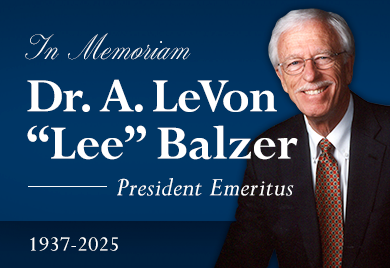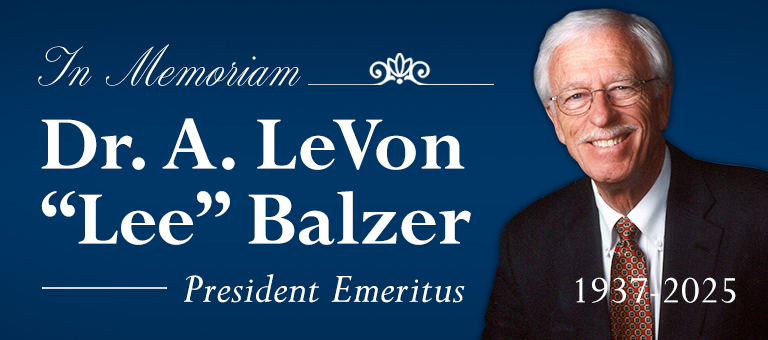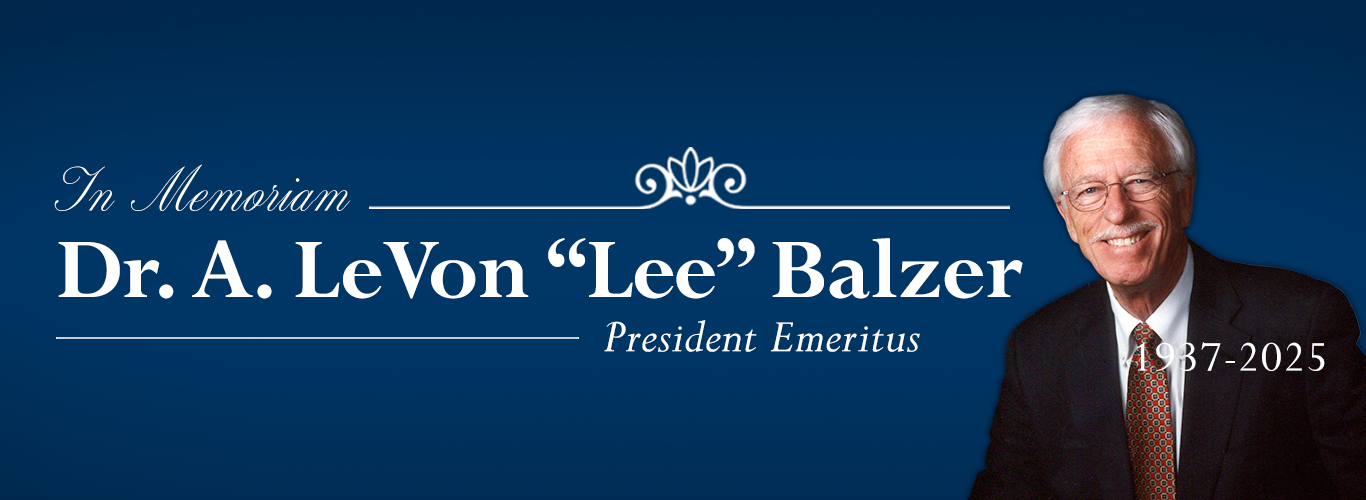A Legacy of Visionary Leadership
Dr. A. LeVon “Lee” Balzer’s Transformative Decade at JBU
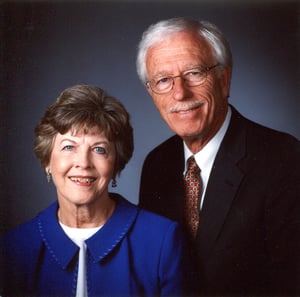
When Dr. A. LeVon “Lee” Balzer and his wife Alice arrived at John Brown University on August 1, 1994, the university needed a stabilizing force to complete the transition from over seven decades of Brown family leadership.
What followed during Balzer’s 10-year presidency was a remarkable period of growth, innovation and renewed commitment to JBU’s foundational principles that significantly shaped the institution’s trajectory.
Though today’s students and the alumni of the last 20 years may not know much about Balzer and his decade leading JBU, his forward-thinking leadership and deep commitment to students’ academic and spiritual growth developed or expanded many of the programs that make JBU what it is today — The Gathering, growth groups, domestic and international mission trips, the graduate program and the Center for Healthy Relationships.
“Lee brought Godly, wise, thoughtful and forward-thinking leadership to JBU,” said Chip Pollard, who became president in 2004 after Lee retired.
Strategic Servant Leadership
Before arriving in Siloam Springs, Balzer had spent six years as the president of Tabor College in Hillsboro, Kansas.
“Dr. Balzer embodied the Tabor mission of preparing people for a life of learning, work and service for Christ and His Kingdom,” said Tabor College President David Janzen, Ph.D. “He valued scholarship and academic rigor as a context and platform for sharing Christ and His love with our students and the world. Dr. Balzer’s background and presence instilled a confidence in the institution that people wanted to come alongside.”
Janzen also credited Balzer with being “able to get things done,” including constructing a new music education center in those six years.
Balzer brought that same strategic focus to JBU at a crucial time. He came to JBU after a tumultuous year of presidential transition. Hired in 1993, Dr. George F. Ford led the university for less than 10 months before resigning amid concerns about his more formal, autocratic, top-down leadership style.
Balzer’s more collaborative leadership style was a much better fit with the identity and culture of JBU.
“What was ingrained in my perception of Lee, from the very beginning of our working relationship, was his humility and that a humble spirit influenced and directed his leadership style,” said Al Cureton, Ph.D., JBU vice president for university advancement from 1995-2001. “I believe his Mennonite Brethren upbringing was a significant factor in shaping his leadership style, a style with firmness laced with humility and grace.”

From his earliest days, Balzer demonstrated exceptional foresight when planning for JBU’s future. He and the board of trustees initiated a comprehensive strategic planning process to guide the university toward unprecedented growth and recognition over the next decade.
This wasn’t merely an administrative exercise but a call to the JBU community to envision the university’s future in creative and innovative ways. Balzer hoped to propel the university to recognition as a “world-class institution,” always seeking “God’s highest and best.” At the core of this strategic planning was a renewed commitment to JBU’s historic identity, reaffirming the mottos of “Christ Over All” and “Head, Heart, Hand” that reunited the JBU community and encouraged growth.
“[Lee’s] leadership style was never pushy or arrogant, but we never questioned where or why we were moving in any particular direction,” said Steve Beers, Ed.D., who served as vice president for student development from 1998 to 2024. “I imagine this strength and service posture emerged partly due to his giftedness, mixed with his rootedness in growing up in the humble farm communities of the Oklahoma panhandle.”
Academic Excellence and Institutional Growth
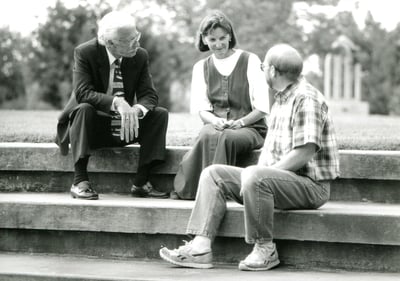
Balzer recognized that JBU’s greatest asset was its people. To become a world-class institution, the university must recruit high-caliber faculty and provide resources for continued research and professional growth. He also recognized that faculty needed specific training on integrating faith into their classroom teaching.
Balzer helped secure a Pew Foundation grant specifically for faculty development, and JBU started a paid summer training program for faculty and select staff to understand the importance of integrative work and how best to implement it on campus.
Ed Ericson, Ph.D., who later became vice president for academic affairs, was one of those new faculty members, hired to teach history. Balzer invited him to lunch to get to know him, a practice he repeated with other faculty.
“I thought, ‘Wow, what kind of place is this and what kind of man is Lee to pay such special attention to a young guy who had only been at the school a few months,’” Ericson said.
Chip Pollard, JBU president since 2004, said that Balzer’s greatest impact on his early years was the cabinet members Balzer had hired.
“They were all fantastic, leaders in their various CCCU peer groups and deeply committed to JBU’s mission,” said Pollard. “In the vice president positions, I only had one change in the cabinet, due to a retirement, for my first 15 years or so. That is unheard of among my peers, and it was a direct result of Lee recruiting and hiring excellent leaders.”
Balzer’s organizational improvements included reorganizing academic leadership, hiring JBU’s first provost and significantly expanding the university’s educational offerings. JBU added new undergraduate majors in the growing digital media and computer science fields.
The Advance Degree Completion Program, which had been in the planning stages for several years, launched shortly before Balzer’s presidency. Offering a degree in organizational management to start, the program expanded rapidly, growing to 422 students and adding a degree in business information systems by spring 2004. Eventually, as many classes shifted to online, the program was renamed JBU Online; today, it offers seven fully online bachelor’s degrees.
Balzer charged Jim Barnes, who had an engineering background and served as the president’s assistant, with pursuing accreditation for the university’s engineering program from the Accreditation Board for Engineering and Technology. After much work, a comprehensive review and a site visit, JBU received ABET accreditation in 1997, a testimony to the program’s quality.
After 76 years focused on undergraduate education, the university launched its first graduate program — a master’s in counseling — in 1995. In 1999, the university added a Master of Science in leadership and ethics, followed by an MBA, which received full accreditation by the North Central Association in October 2000. In 2002, JBU earned specialized accreditation from the International Assembly for Collegiate Business Education — the first such specialized accreditation for JBU’s business programs.

“Without hesitation, I can say Lee raised the visibility of JBU nationally and internationally,” said Cureton. “Through his efforts of intentionally raising the university’s visibility, people, throughout the state and region, began to see the JBU brand as a place of strong academic quality, solid financial stability and clear Christ-centered mission.”
The university’s academic reputation flourished through competitive student achievements, including national placement for the Students in Free Enterprise in 2003 and first place for Arkansas’s speech and debate team in 2004. JBU’s Alpha Chi National Honor Society chapter earned “Star Chapter” status for eight consecutive years and won the President’s Cup in 2003, the national top honor in competition with 300 other chapters.
JBU was soon consistently recognized by U.S. News as one of the best regional liberal arts colleges in the South and one of the best values in that category. The Templeton Foundation repeatedly honored JBU as a “College of Character.”
“Lee was kind, but clear in making sure we saw ourselves as more than a small institution in the Mid-South of the U.S.,” said Beers, citing one example. Well before the rapidly expanding Starbucks opened a retail location in Arkansas, Balzer ensured that the California Cafe in the new Walker Student Center, built in 2000, served Starbucks and proudly displayed the logo on the door.
In Balzer’s final year, total enrollment across all JBU programs reached a historic high of 1,834 — the highest in each category: residential, traditional undergraduate, advance program and graduate.
Nurturing Spiritual Formation
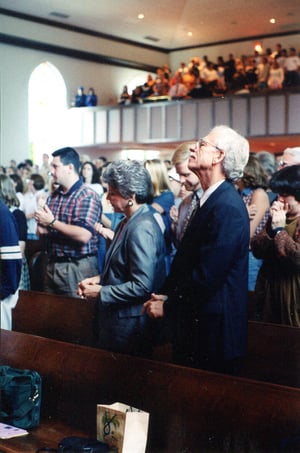
While academic excellence flourished, Balzer ensured that spiritual growth remained at the heart of JBU’s mission. In 1999, the university took significant steps to strengthen its intentional focus on Christian development, including creating a Spiritual Formation Committee to guide efforts and expanding the Campus Ministries office to become the Office of Christian Formation.
JBU’s commitment to integrating faith and learning thrived with enhanced programming and additional staff. Student-focused initiatives multiplied, including Passion small groups, expanded domestic and international mission opportunities, CAUSE outreach ministries and the annual Breakaway retreat.
In fall 2002, the student-led Sunday night chapel service The Gathering was established — a legacy that continues to impact student spiritual life today. Athletic teams embraced Christ-centered service with volleyball, basketball and rugby teams incorporating ministry into their travel and competition.
Campus Transformation
The most immediately visible aspect of Balzer’s legacy is the physical transformation of JBU’s campus. The strategic plan Balzer and the board created after his arrival included a new Campus Master Plan that established priorities for facility improvements and identified urgent needs for expansion, setting the stage for two decades of campus transformation.
At the forefront of the list was a new student center.
In a 2019 interview for JBU’s centennial, Balzer said, “There wasn’t a good place for students to gather with people, to gather with faculty and staff and ministers, and that seemed very central to a Christian educational community. We needed to take the steps in faith and pray that it would come through.”
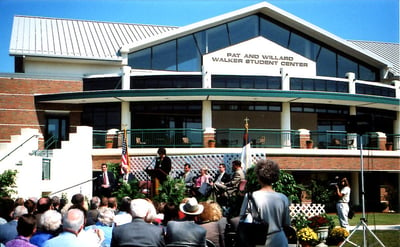
In addition, the university needed a new science hall, additional student housing, scholarship funding and endowment funding for two centers: one focused on marriage and family relationships, the other on business leadership and ethics.
Cureton says that Balzer’s drive for the university to be a world-class institution gave the university the substance to launch the first successful major giving campaign in university history. “Campaign 2000: God’s Highest and Best” had a $32 million goal.
“Never before had the university generated the giving levels that we did in that first true comprehensive campaign,” said Cureton. “The synergy created throughout the campus was contagious and exciting. Earning U.S. News’ No. 1 ranking in the South among private colleges was due to his [Balzer’s] drive to give God our highest and best.”
In January 2000, JBU announced that generous donors had given more than $39.7 million to this vision.
“It was a crystal clear, almost shouting, example of God’s faithfulness,” Balzer said in that interview.
The campaign’s success and the additional funds raised after enabled the construction of major new facilities, including the Pat and Willard Walker Student Center and Residence Hall, Bell Science Hall, phase 1 of North Hall (now Hutcheson Hall) and the Soderquist Business Center. The former science center in Cathedral Plaza was renovated and became Windgate Visual Arts West, and much-needed upgrades were made to the university’s central power plant.
Between 1994 and 2019, 23 major building and renovation projects added over a million square feet of enclosed space to campus, many following the Campus Master Plan developed decades earlier. One of those, a new building for engineering and construction management, was named the LeVon and Alice Balzer Technology Center in honor of the couple’s extraordinary contributions to the university.
Partnership in Presidential Leadership
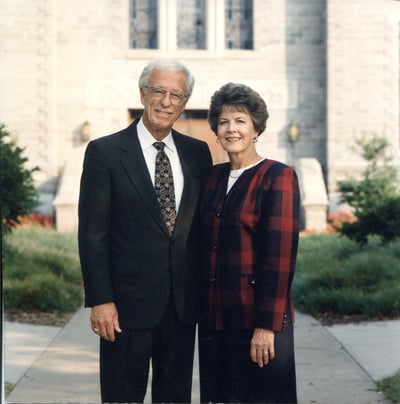
Balzer’s presidency was distinguished not only by institutional achievements but also by the gracious hospitality and unified partnership he shared with his wife, Alice. Together, they exemplified servant leadership, creating a warm campus culture that reflected their personal values and commitment to the community.
Lee and Alice regularly opened their campus home for special events and gatherings, hosting everything from university functions to an open house for special guests and employees. These events weren’t mere obligations but expressions of genuine care for the JBU community.
Alice McQuay, who served in the Office of the President and frequently worked with Alice Balzer as she entertained campus visitors, observed that “she and Lee were a unified team in caring for all the university personnel and all campus guests.”
The Balzers’ approach to leadership was marked by humility and service rather than a desire for the spotlight.
“Lee and Alice were neither flashy nor did they need to be in the center of attention. Instead, they continually took the role of service,” said Beers. “When we were not able to get back to Indiana for Thanksgiving with our extended family, Lee and Alice had us over to their home with their family.”
Balzer’s visibility on campus was intentional yet unobtrusive. He created the State of the University address tradition, attended faculty meetings without dominating them (letting faculty know he cared and was present), and regularly attended athletic events, musical performances and other university activities. Alice typically accompanied him, and their joint presence conveyed a unified commitment to the JBU community. This leadership style had a profound impact on campus culture.
“It is said that a university takes on the personality of its president,” said Cureton. “JBU did that. During Lee’s years of leadership, the community began to reflect his personality traits and strengths.”
Even former students from their previous institution, Tabor College, remember the personal touch the Balzers brought to their roles. David Janzen, now Tabor’s president but then a student during Balzer’s presidency there, fondly recalled how Balzer talked about his science background and career aspirations with him.
“He took the time to speak with me in a way that inspired me to imagine what I might do someday,” Janzen said. He even recalled the lighter moments, like when Balzer let students take their residence hall picture with his “pretty sweet white BMW” on the campus lawn.
A Lasting Legacy
Balzer officially retired from the JBU presidency in 2004, but his transformative decade had already set the university on a trajectory that continues to shape its identity today. His strategic vision, commitment to academic excellence, and emphasis on spiritual formation created a foundation that subsequent leaders have built upon.
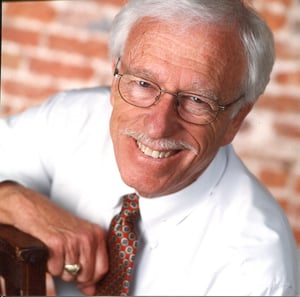
Balzer’s impact extended far beyond the buildings he helped construct or the programs he initiated. His humble, service-oriented leadership style became woven into the fabric of JBU’s culture. The integrated approach to faith and learning he championed, the emphasis on developing both the head and heart and the commitment to genuine community he fostered with Alice continue to define the JBU experience.
In an email to the JBU community, Pollard reflected, “In James 3:17, we read ‘the wisdom that is from above is first pure, then peaceable, gentle, willing to yield, full of mercy and good fruits, without partiality and without hypocrisy.’ It is an apt description of Lee’s leadership. His commitment to Christ and Christ-centered education shaped his life and the trajectory of JBU, and we are all the beneficiaries of his good work.”
Today, as students gather in the Walker Student Center, conduct research in Bell Science Hall, worship at The Gathering or participate in mission trips worldwide, they are experiencing the fruits of Balzer’s vision. His legacy lives on not just in the physical spaces and academic programs he championed, but in the spirit of excellence, humility and faithful service that continues to characterize John Brown University.
In pursuing “God’s highest and best,” Dr. A. LeVon “Lee” Balzer didn’t just transform a university — he helped shape generations of students who would carry those same values into the world. That, perhaps, is the most enduring measure of his remarkable decade of leadership.
Written by Julie Gumm, JBU chief marketing & communications officer. This article relies heavily on the excellent historical research compiled by Paul Semones, author of "Christ Over All: A History of John Brown University," published by the university in 2019.
President Emeritus Dr. Lee Balzer, President Chip Pollard & President Emeritus John E. Brown III in 2019.
